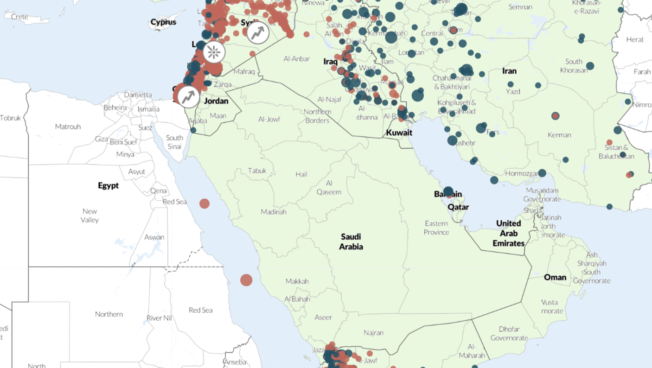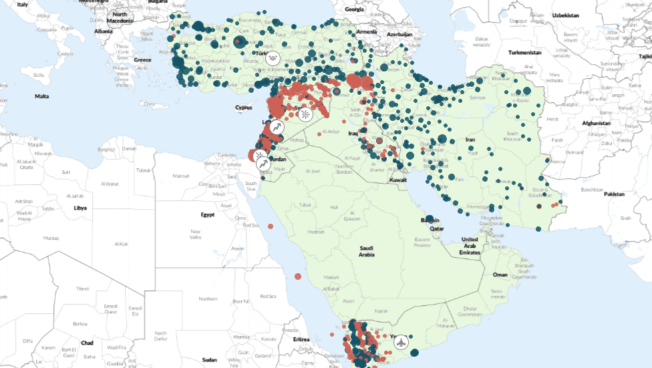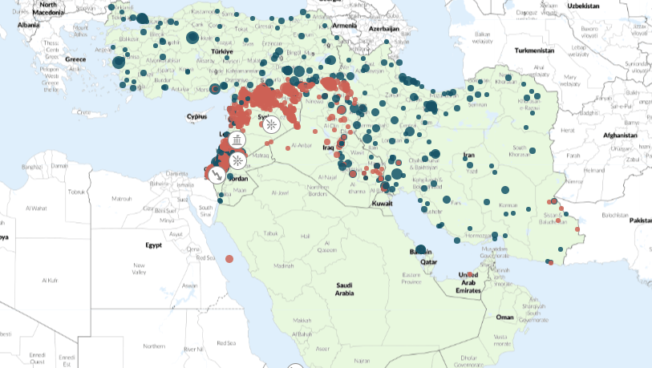Regional Overview
Middle East
July 2023
Posted: 3 August 2023
 Iraq: Sadrist Movement leads demonstrations against Quran burning
Iraq: Sadrist Movement leads demonstrations against Quran burning
Demonstrations over Quran burnings in Sweden and Denmark continued in Iraq in July, accounting for 35% of all demonstrations recorded by ACLED across the country. Demonstrators, mainly followers of the prominent Shiite cleric Muqtada al-Sadr, stormed the Swedish embassy on 20 July, causing a fire. Two days later, they tried to storm the Green Zone to attack the Danish embassy. During the month of July, the Sadrist Movement participated in or organized nearly half of demonstrations against Quran burnings. Sadr’s followers also stormed the offices of the Dawa party in several cities on 15 July following accusations that the rival party insulted the late Grand Ayatullah Muhammad al-Sadr. Sadrists’ recent mobilizations exhibit the ongoing ability of the influential cleric to create demonstration-based instability in the country, despite the withdrawal of his movement from politics last April. Unconfirmed reports further suggest that Sadr is considering participating in December’s provincial elections.1Suadad al-Salhy, ‘Why Iraq thinks a plot is fanning the flames of its diplomatic crises,’ Middle East Eye, 29 July 2023
 Israel: Domestic political crisis worsens as judiciary reform bill passes in parliament
Israel: Domestic political crisis worsens as judiciary reform bill passes in parliament
On 24 July, Israeli parliament passed the first bill of a judicial overhaul sought by the right-wing government of Prime Minister Benjamin Netanyahu, which removes the Supreme Court’s authority to cancel government decisions it deems unreasonable.2Steve Hendrix,Shira Rubin, Leo Sands and Miriam Berger, ‘Israeli parliament passes judicial overhaul plan; White House calls move ‘unfortunate’,’ Washington Post, 24 July 2023 The bill was ratified despite widespread domestic and international opposition, including a call by United States President Joe Biden to postpone the vote.3Barak Ravid, ‘Exclusive: Biden says Bibi shouldn’t rush “divisive” judicial overhaul bill amid threats,’ Axios, 23 July 2023 Hundreds of demonstrations have been held against the judicial reforms across the country since the start of 2023, with more demonstration events already recorded in the first seven months of the year than any full year since the beginning of ACLED data collection for Israel in 2016. In July, the number of demonstration events increased by over 60% compared to the month prior. Nationwide labor strikes were also reported in different sectors, including the tech and healthcare sectors. Furthermore, at least 1,000 Israeli army reservists – including combat pilots – are believed to have resigned in protest against the bill, with thousands of others threatening to stop reporting for duty.4Patrick Kingsley and Ronen Bergman, ‘A Sense of Mission at Risk as Israeli Reservists Resign to Protest New Law,’ New York Times, 29 July 2023 Israel’s internal turmoil is likely to intensify as the government continues to proceed with the reforms.
 Palestine: Elevated tensions as Israel carries out biggest West Bank operation in 20 years
Palestine: Elevated tensions as Israel carries out biggest West Bank operation in 20 years
In early July, Israel launched a major aerial and ground offensive in the Jenin area, claiming to target a militant “joint operational command center.”5Yolande Knell and David Gritten, ‘Jenin: Israeli military launches major operation in West Bank city,’ BBC News, 4 July 2023 The raid is believed to have been the largest military operation in the West Bank in two decades. During the two-day operation, at least 12 Palestinian militants and one Israeli soldier were reportedly killed, while more than 100 people were injured. Amid a twofold increase in political violence involving armed groups in the West Bank over the past 12 months compared to the same preceding period, the Jenin refugee camp has become a hotbed of armed engagement between Palestinian militants and the Israeli army. Despite the Jenin operation, political violence involving Palestinian armed groups continued in July at levels similar to the month prior, with the northern governorates of Nablus, Jenin, and Tulkarm continuing to be the center of armed activity.
 Syria: Rising tensions between QSD and the Arab majority in Dayr al-Zawr governorate
Syria: Rising tensions between QSD and the Arab majority in Dayr al-Zawr governorate
On 25 July, widespread clashes took place between the Syrian Democratic Forces (QSD) and its affiliate, the Dayr al-Zawr Military Council (DMC), in several towns and villages in eastern Dayr al-Zawr governorate following the arrest of several DMC members by QSD’s military police. The DMC, an Arab-majority military council, was supported by various Arab tribal militias during the fighting. Although clashes subsided after the intervention of the Global Coalition Forces, they brought to the forefront the fraught relationship between the Kurdish-led QSD and the Arab majority in Dayr al-Zawr governorate.6Staff Writer, ‘Deir-ez-Zor: Elders Call on SDF to Strengthen Arab Role,’ Syrian Observer, 22 March, 2022. The clashes were preceded by more than a year of protests and riots denouncing QSD policies and violence against Arab civilians and the lack of basic services, despite the governorate’s wealth in oil and gas resources. Furthermore, in recent months, the region saw an escalation in communal and tribal violence as a result of a growing security vacuum, allowing for further friction between local populations and the QSD.
 Yemen: Power outages fuel demonstrations in southern Yemen
Yemen: Power outages fuel demonstrations in southern Yemen
Demonstrations broke out in southern Yemen, sparked on 12 July by the depreciation of the Yemeni rial and worsening power outages. Demonstrations took place in Aden and in the southern governorates of Abyan, Lahij, and Hadramawt. In Aden, demonstrations more than doubled in July compared to the average of the previous six months, as the southern port city reached its highest demonstration levels since December 2021. Houthi forces could take advantage of the ongoing unrest to justify future attacks on southern Yemen under the auspices that the population is suffering at the hands of the Internationally Recognized Government (IRG) and the Southern Transitional Council (STC). Yemen spiraled into a civil war in 2014 when the Houthis ousted the IRG from Sanaa. The IRG is now based in Aden, although the city is largely controlled by the secessionist STC.
العراق: يقود التيار الصدري مظاهرات ضد حرق القرآن
واستمرت المظاهرات في العراق ضد حرق القرآن في السويد والدنمارك في تمُّوز/يوليو وشكلت ٣٥٪ من جميع المظاهرات الّتي سجلتها ACLED في جميع أنحاء البلاد. واقتحم المتظاهرون، الذين كان معظمهم من أتباع رجل الدين الشيعي البارز مقتدى الصدر، السفارة السويدية في ٢٠ تمُّوز/يوليو، ما تسبب في اندلاع حريق. كما حاولوا بعد يومين اقتحام المنطقة الخضراء لمهاجمة السفارة الدنماركية. وخلال شهر تمُّوز/يوليو، شارك التيار الصدري أو نظم تقريباً نصف المظاهرات ضد حرق القرآن. وهاجم أتباع الصدر أيضاً مكاتب حزب الدعوة في عدة مدن في ١٥ تمُّوز/يوليو، بعد اتهامات بأن الحزب المنافس أهان الراحل آية الله محمد الصدر. وأظهرت التحركات الأخيرة للتيار الصدري القدرة المستمرة لرجل الدين المؤثر على خلق حالة من عدم الاستقرار من خلال المظاهرات في البلاد، على رغم من انسحاب حركته من السياسة في نيسان/أبريل الماضي. وتقول أنباءٌ غير مؤكدة أن الصدر يفكر بالمشاركة في انتخابات مجالس المحافظات في كانون الأول/ديسمبر.[1]
إسرائيل: تفاقمت الأزمة السياسية الداخلية مع إقرار قانون إصلاح القضاء في البرلمان
أقر البرلمان الإسرائيلي في ٢٤ تمُّوز/يوليو أول قانون لإصلاح قضائي تسعى إليه الحكومة اليمينية برئاسة بنجامين نتنياهو، والذي يلغي سلطة المحكمة العليا في إلغاء قرارات حكومية الّتي تراها غير معقولة.[2] وتمت المصادقة على القانون على الرغم من العديد من المعارضات المحلية والدولية بما في ذلك دعوة من رئيس الولايات المتحدة جو بايدن لتأجيل التصويت.[3] وخرجت مئات المظاهرات في جميع أنحاء إسرائيل ضد مشروع قانون الإصلاح القضائي منذ بداية عام ٢٠٢٣، مع تسجيل المزيد من المظاهرات في إسرائيل بالفعل في الأشهر السبعة الأولى من العام مقارنة بأي عام سابق منذ بداية مشروع ACLED في جمع البيانات في البلاد في عام ٢٠١٦. وازداد عدد أحداث المظاهرات بنسبة تزيد عن ٦٠٪ في شهر تمُّوز/يوليو مقارنةً بالشهر الماضي. كما أُباغ عن إضرابات عمل على مستوى البلاد في قطاعات مختلفة، بما في ذلك قطاعي التكنولوجيا المتقدمة والرعاية الصحية. علاوة على ذلك، يُعتقد أن ما لا يقل عن ١٠٠٠ من جنود الاحتياط في الجيش الإسرائيلي، بمن فيهم الطيارين المقاتلين، قد استقالوا احتجاجاً على تمرير مشروع القانون، مع تهديد الآف الآخرين بالتوقف عن العمل.[4] ومن المرجح أن تشتد الاضطرابات الداخلية في إسرائيل مع استمرار الحكومة الإسرائيلية في المضي قدماً في الإصلاح القضائي.
فلسطين: تصاعد التوترات مع قيام إسرائيل بتنفيذ أكبر عملية في الضفة الغربية منذ ٢٠ عاماً
في أوائل تمُّوز/يوليو، شنت إسرائيل هجوماً جوياً وبرياً كبيراً في منطقة جنين بدعوى استهداف مقاتل “لمركز قيادة العمليات المشتركة.”[5] ويُعتقد أن المداهمة كانت أكبر عملية عسكرية في الضفة الغربية منذ عقدين. وأفادت الأنباء خلال العملية التي استمرت يومين عن مقتل ما لا يقل عن ١٢ مسلحاً فلسطينياً وجندي إسرائيلي واحد، بينما أصيب أكثر من ١٠٠ شخص. ووسط زيادة مضاعفة في أعمال العنف السياسي الّتي تورطت بها الجماعات المسلحة في الضفة الغربية خلال ١٢ شهراً الماضية مقارنة بنفس الفترة السابقة، أصبح مخيم جنين للاجئين بؤرةً للاشتباك المسلح بين المسلحين الفلسطينيين والجيش الإسرائيلي. على الرغم من عملية في منطقة جنين، استمر العنف السياسي الذي تورطت فيه الجماعات الفلسطينية المسلحة في تمُّوز/يوليو بمستويات مماثلة للشهر السابق، مع استمرار بقاء محافظات نابلس وجنين وطولكرم في الشمال بكونهم مركزاً للنشاط المسلح.
سوريا: تصاعد التوترات بين القوات السورية الديمقراطية والغالبية العربية في محافظة دير الزور
في ٢٥ تمُّوز/ يوليو اندلعت اشتباكات واسعة النطاق بين القوات السورية الديمقراطية وتابعها، مجلس دير الزور العسكري، في عدة بلدات وقرى شرق محافظة دير الزور، بعد اعتقال عدد من أعضاء المجلس من قبل شرطة القوات السورية الديمقراطية العسكرية. وتلقى المجلس، وهو مجلس عسكري ذو أغلبية عربية، دعماً من قبل مختلف الميلشيات القبلية العربية أثناء القتال. وعلى الرغم من أن الاشتباكات هدأت بعد تدخل قوات التحالف الدولي، إلا أنها أبرزت العلاقة المشحونة بين القوات السورية الديمقراطية التي يقودها الأكراد والأغلبية العربية في محافظة دير الزور.[6] وسبق هذه الاشتباكات احتجاجات وأعمال الشغب لأكثر من عام منددة بسياسات القوات السورية الديمقراطية والعنف ضد المدنيين العرب ونقص الخدمات الأساسية على الرغم من ثروة المحافظة من موارد النفط والغاز. إضافة إلى ذلك، شهدت المنطقة في الأشهر الأخيرة تصعيداً في العنف الطائفي والقبلي نتيجة للفراغ الأمني المتزايد، ما سمح بمزيدٍ من الاحتكاك بين السكان المحليين والقوات السورية الديمقراطية.
اليمن: انقطاع التيار الكهربائي يتسبب بمظاهرات في جنوب اليمن
اندلعت مظاهرات في جنوب اليمن في ١٢ تمُّوز/يوليو بسبب انخفاض قيمة الريال اليمني وتفاقم انقطاع التيار الكهربائي، في عدن وفي محافظات أبين ولحج وحضرموت الجنوبية. وتضاعفت المظاهرات في عدن في تمُّوز/يوليو مقارنة بمتوسط الأشهر الستة السابقة، حيث وصلت المظاهرات في المدينة الساحلية الجنوبية إلى أعلى مستوياتها منذ كانون الأول/ديسمبر ٢٠٢١. ويعتقد أنه من الممكن أن قوات الحوثي أن تستفيد من الاضطرابات المستمرة لتبرير الهجمات المستقبلية على جنوب اليمن تحت رعاية السكان الذين يعانون على أيدي الحكومة المعترف بها دولياً (IRG) والمجلس الانتقالي الجنوبي (STC). تصاعدت حرب اليمن عام ٢٠١٤ عندما طرد الحوثيون الحكومة المعترف بها دولياً من صنعاء. يقع مقر الحكومة المعترف بها دولياً الآن في عدن، على الرغم من أن المدينة تخضع إلى حد كبير لسيطرة المجلس الانتقالي الجنوبي الانفصالي.
[1]سعاد الصالحي، «أسباب اعتقاد العراق بوجود مؤامرة تؤجج نيران أزماته الدبلوماسية» ميدل إيست آي، ٢٩ تمُّوز/يوليو ٢٠٢٣
[2] ستيف هندريكس، وشيرا روبين، وليو ساندز، وميريام بيرغر، «البرلمان الإسرائيلي يقرّ خطة الإصلاح القضائي؛ والبيت الأبيض يسمي هذه الخطوة بأنها “مؤسفة“» واشنطن بوست، ٢٤ تمُّوز/يوليو ٢٠٢٣
[3] باراك رافيد، «حصري: بايدن يقول إنه لا يجب على بيبي التسرع في مشروع قانون إصلاح قضائي” مثير للانقسام” وسط التهديدات» أكسيوس، ٢٣ تمُّوز/يوليو ٢٠٢٣
[4]باتريك كينجسلي ورونين بيرغمان، «إحساس بتعرض المهمة للخطر مع استقالة جنود الاحتياط الإسرائيليون للاحتجاج على القانون الجديد»، نيويورك تايمز، ٢٩ تمُّوز/يوليو ٢٠٢٣
[5] يولاند كنيل وديفيد غريتن ، «جنين: الجيش الإسرائيلي يطلق عملية كبيرة في مدينة الضفة الغربية» بي بي سي نيوز، ٤ تمُّوز/يوليو ٢٠٢٣
[6]كاتب من طاقم العمل، «دير الزور: الحكماء يطالبون القوات السورية الديمقراطية بتعزيز الدور العربي» المرصد السوري، ٢٢ آذار/مارس ، ٢٠٢٢.
See More
See the Codebook and the User Guide for an overview of ACLED’s core methodology. For additional documentation, check the Resource Library. Region-specific methodology briefs can be accessed below.
Links:







